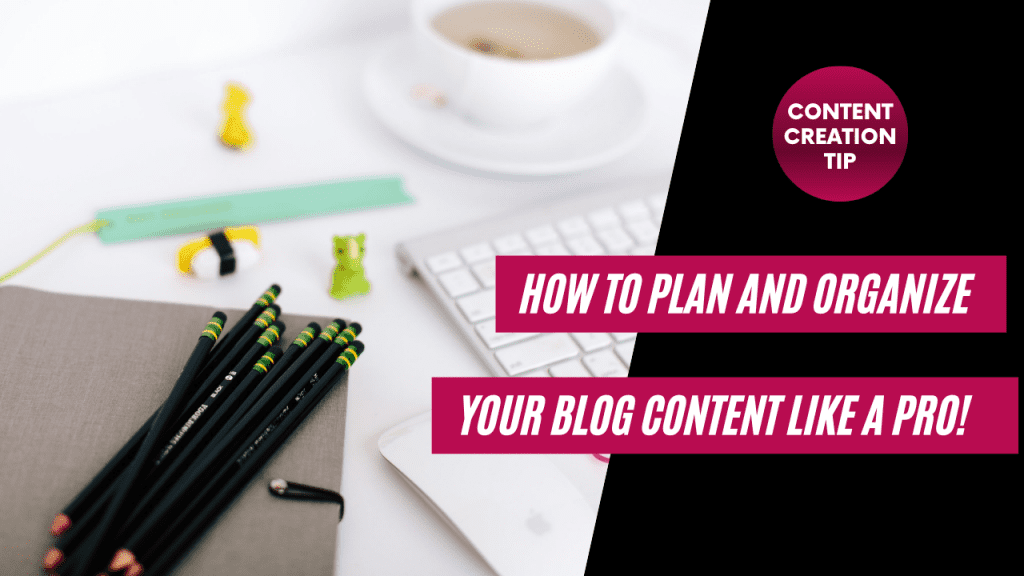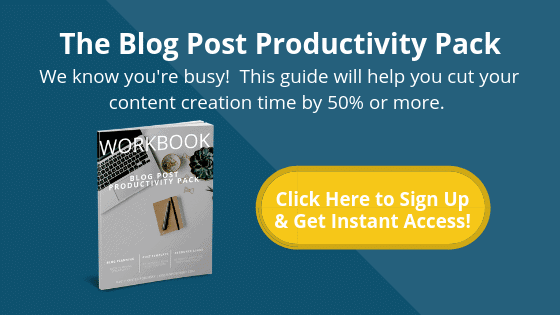One of the most asked questions I get asked is how do I make planning and organizing blogs easier so that I can be more productive?
Lots of my clients start out reluctantly content (blogging) and in our over 7 years of handling thousands of posts a year, we’ve created a process for planning and organizing blog posts that takes all of the stress out of the equation.
I’m sharing my personal and the very same plan and organization process I use for my clients and taught to my student in Smart Simple Content Marketing to help you get started.
Here’s my 7 part process to planning and organizing blogs:
Step 1: Use a Planner
When you plan your content in advance, it really simplifies your planning and organizing blogs into a more manageable task.
I recommend planning no more than a quarter at a time and I do my post research all in a single sitting at the beginning of a quarter and then generally take a quick relook at things based upon reviewing my blog performance.
So If I see that a particular subject was off the charts, I’ll change my content plan to write more about that subject so I can deliver more of what my audience is interested in.
Tools I use:
Content Planning Spreadsheet – I’ve got a spreadsheet already built for you and bundled it with my Blog Post Template in your Blog Post Productivity Workbook Download
Buzzsumo and Answer The Public for content research – links are included your Blog Post Productivity Workbook Download
Step 2: Use a Template to Write Your Post
After I have planned out my content the next step to planning and organizing blogs, I use a template to write my posts. This way I can hand it off to my team to set up on my site.
Using this template both my clients and I never miss a thing that needs to be included on our posts.
Having a template ensures consistency and it also allows me to write at my leisure, come back a couple of times and make changes to my content as needed. I also have the essentials on the template needed make completing my on Page SEO a breeze.
Tools I use:
Blog Post Template – I’ve got my template already built for you and bundled it with my Content Planning Spreadsheet in your Blog Post Productivity Workbook Download.
Using this template will really cut your time spent planning and organizing blogs.
Step 3: Use Batch Processing
I normally batch process my blog post writing in 1-2 sittings each month. I already have them planned using the content planning spreadsheet. Then I have time blocked on my calendar and I plan to write 4 posts in a single sitting.
Doing this takes the stress off of having to do it weekly.
I set my timer for 90 minutes first thing in the morning and I am able to get into the flow and write 2 posts in a single sitting. Getting these done early in the day is a real motivator and makes me feel like I can push through and get them all done!
Then I take a break and come back in afternoon and bang out the remaining two.
Once they are all done I go find my images and add them to each post at the end all at the same time. I like to set a timer and spend no more than 5- 10 minutes browsing per image at the most!
You can get more writing tips here that will help you during this part of the process – How to Become a More Productive Writer: 7 Helpful Tips
Tools I use:
My favorite three places to find images are photo dune, Unsplash and bigstock photos – links are included in your Blog Post Productivity Workbook Download
Bonus tip: Build a library of draft posts
Batch in 1-2 posts a month to use when you are on vacation or really need a break from blogging, you’ll be glad you did!
I break it down for you in this article where I cover the 5 steps to making effective use of your content creation time.
Step 4: Set up Your Content
Set up your post on your blog the day before.
Doing this in advance reduces the stress of having to write, post, and promote your content all in one sitting.
I don’t know about you but I want to enjoy this process and write great content for my tribe. From my experience and that of my clients, I know that having a stress-free method to plan and organize blog posts really helps!
Step 5: Perform On-Page SEO
You want to get the most traffic for your efforts, right?
Optimizing my blog post for keywords is an essential part of how I plan and organize blog posts. It should only take you 10-15 minutes and will pay off with organic traffic to your site.
I could write the entire process out for you here, but that wouldn’t be helpful enough
Instead, I’ve included the On-Page SEO Checklist that will take you through the entire process in your Blog Post Productivity Workbook Download.
Using the SEO checklist will not only really cut your time spent planning and organizing blogs, but it will also help you get more organic traffic.
Step 6: Post On High Traffic Days
This is key to getting more eyeballs on your content.
Finding out when you get the most traffic to your blog is as easy as heading over to your google analytics account and seeing when your traffic is at it highest during the week.
If you don’t know, its a safe bet that the highest traffic days are usually Monday-Thursday.
I find it too stressful to start out the week getting a post out so I set mine up for Tuesdays and Thursdays.
Step 7: Promote Your Post
Use your social sharing buttons to promote your post out on social media after it has been published.
You want to use these buttons instead of auto-posting to your site for a couple of reasons
#1 It counts as a social sharing signal to google.
#2 You have more control over the content you share on your platforms
Then schedule time on your calendar a few days later to go and share again so you can reach a whole new audience with your content.
For Twitter, I like to use my tweet this content on my blog post to promote it more than twice so schedule time for that over the next 3-4 days, and you’ll be covered.
Then set up your evergreen content to be continually rotated out on social media.
Tools I use:
Social Oomph for rotating content
Tweet This Plugin for WordPress
Shareaholic Plugin for Social Sharing
* Each of these tools are included in the Blog Post Productivity Workbook Download. I really encourage you to grab the workbook and use it to start planning and organizing your blog posts.




